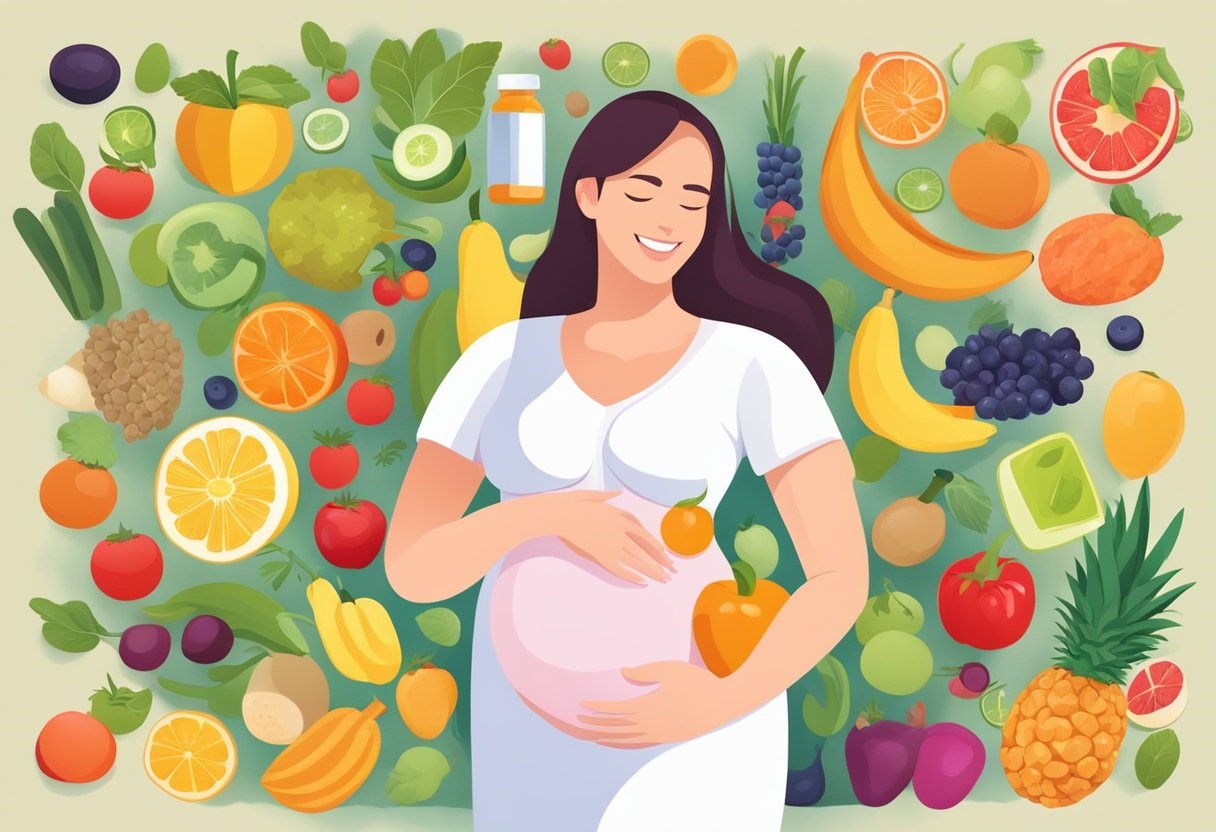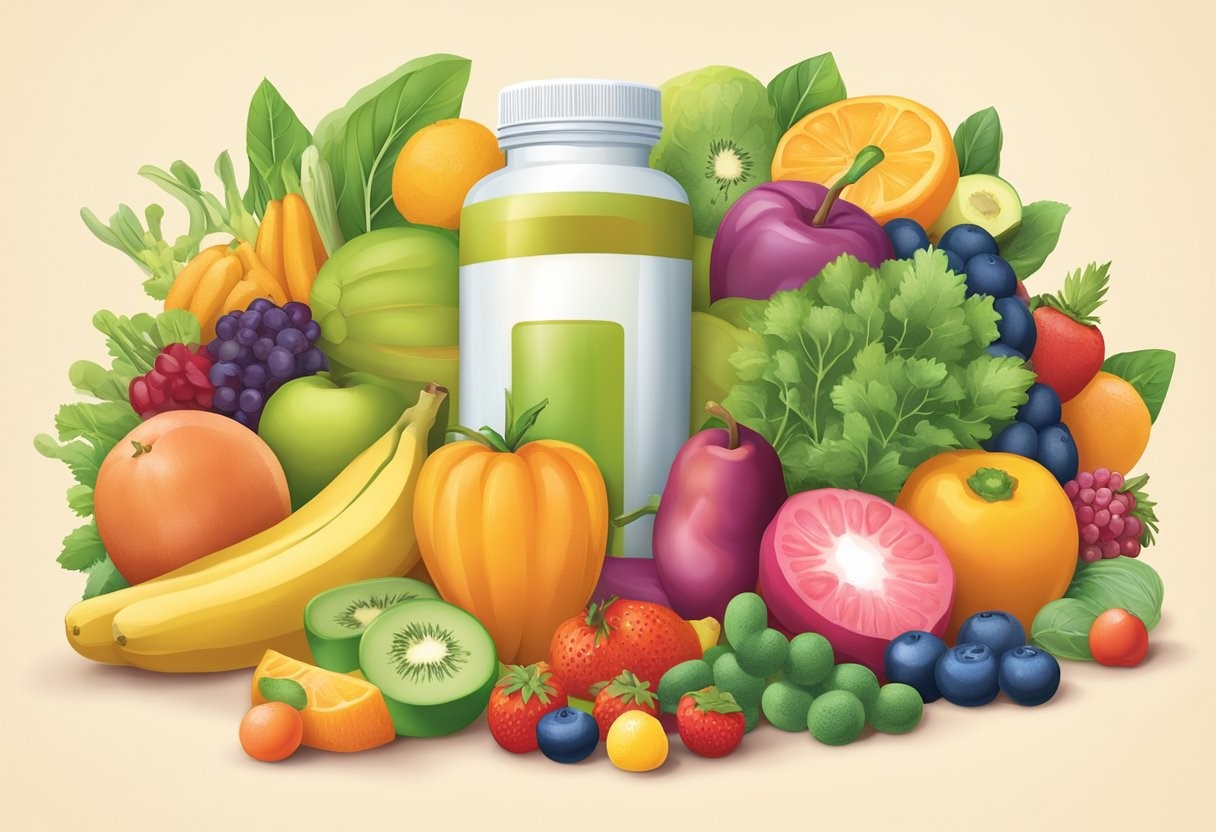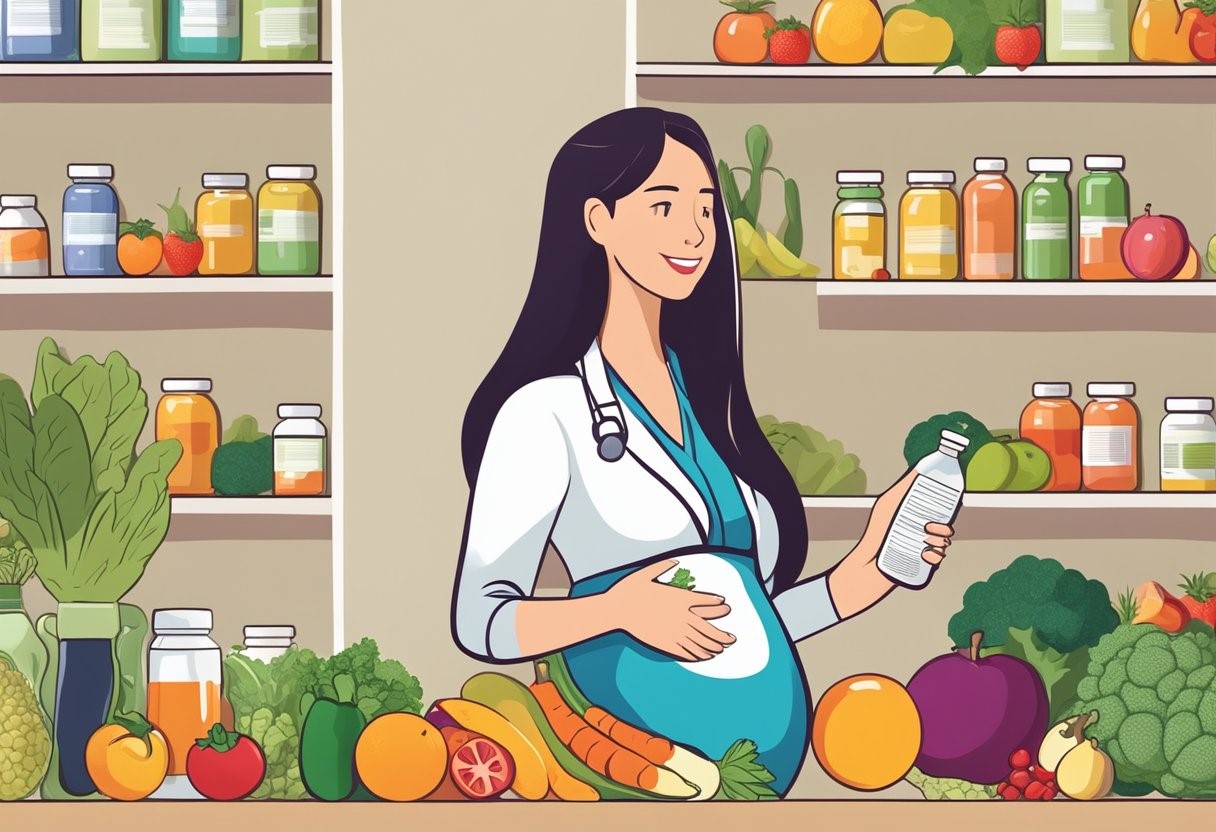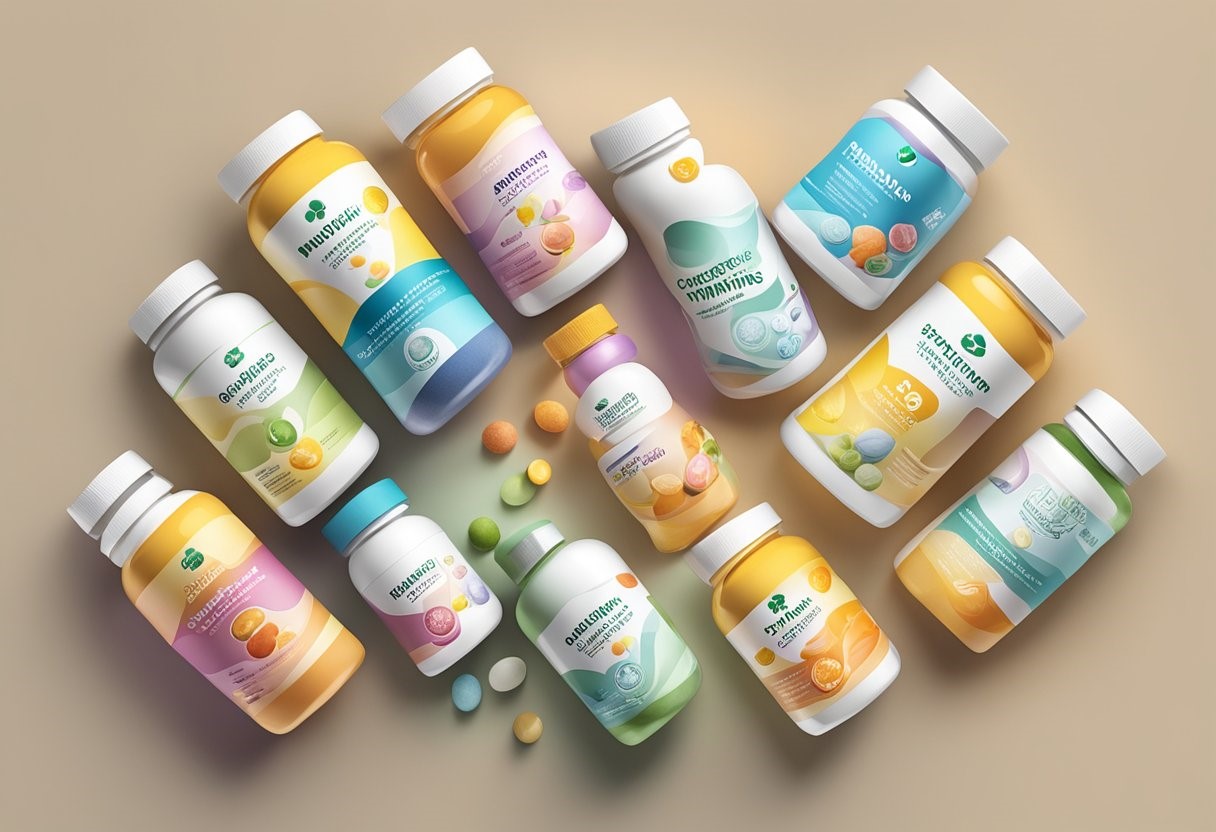









Free Shipping (WM) | Sign Up Biobay Membership for Free 50 Points & Exclusive Benefits
Pregnancy brings many changes to a woman's body, and proper nutrition becomes more crucial than ever. Taking the right supplements can help ensure both mum and baby get the nutrients they need for a healthy pregnancy. In this article, we will delve into the essential nutrients and supplements that can help pregnant women during pregnancy. Doctors recommend prenatal vitamins to fill nutritional gaps and support your baby's growth. These special vitamins contain higher amounts of key nutrients like folic acid, iron, and calcium. They help prevent birth defects and support your changing body as it nurtures new life. While a balanced diet is the best way to get nutrients, supplements can provide extra support. They're especially helpful if you have morning sickness or food aversions that make eating difficult. Remember to chat with your doctor before starting any new supplement routine during pregnancy.
Proper nutrition is crucial during pregnancy. Certain vitamins play key roles in your baby's growth and development. Let's explore the most important ones and how they support a healthy pregnancy.

Folic acid is vital for preventing neural tube defects in your baby. These are serious birth defects that affect the brain and spine. You need 400 to 800 micrograms of folic acid daily.
Good food sources include:
- Leafy green vegetables
- Fortified cereals
- Beans and lentils
Taking a folic acid supplement is recommended. Start before pregnancy if possible. This helps ensure your body has enough when your baby's neural tube forms early in pregnancy.
Vitamin D is essential for your baby's bone development. It also supports your immune system. Vitamin D deficiency during pregnancy can lead to:
- Weak bones in your baby
- Increased risk of preeclampsia
- Higher chance of gestational diabetes
Sunlight helps your body make vitamin D. However, many pregnant women don't get enough from sun exposure alone. Your doctor may recommend a supplement, especially if you have limited sun exposure or darker skin.
Vitamin B12 is crucial for your baby's brain development. It also helps form red blood cells and DNA. A deficiency can lead to:
- Anaemia in you
- Developmental delays in your baby
- Potential neurological problems
Animal products are the main dietary source of B12. If you're vegetarian or vegan, you'll likely need a supplement. Your doctor can check your B12 levels and advise on the right amount for you.
Remember, a balanced diet is best. But prenatal vitamins can help fill any gaps. Always talk to your doctor before starting any new supplements during pregnancy.

Certain minerals play crucial roles in supporting a healthy pregnancy. These essential nutrients contribute to foetal development, maternal well-being, and the prevention of complications.
Iron is a key mineral during pregnancy. Your body needs more iron to make extra blood for your growing baby. Iron deficiency can lead to anaemia, causing fatigue and increasing the risk of preterm birth.
To maintain optimal iron status:
- Eat iron-rich foods like lean meats, beans, and dark leafy greens
- Take an iron supplement as recommended by your doctor
- Pair iron-rich foods with vitamin C to boost absorption
Your iron needs nearly double during pregnancy. Aim for 27 mg daily, but don't exceed 45 mg unless advised by your healthcare provider.
Calcium is essential for bone and tooth growth in your developing baby. It also helps maintain your own bone health during pregnancy.
Good calcium sources include:
- Dairy products
- Fortified plant-based milk
- Leafy greens like kale and broccoli
Aim for 1000 mg of calcium daily. If you're lactose intolerant or vegan, talk to your doctor about calcium supplements.
Calcium also plays a role in muscle function and blood pressure regulation. Getting enough can reduce your risk of pre-eclampsia.
Iodine is crucial for your baby's brain development. A deficiency can lead to intellectual disabilities and growth problems.
To ensure adequate iodine intake:
- Use iodised salt in cooking
- Eat seafood (following pregnancy-safe guidelines)
- Include dairy products in your diet
The recommended daily intake is 220 mcg. Many prenatal vitamins contain iodine, but check the label to be sure.
If you're vegan or avoid dairy and seafood, you may need an iodine supplement. Always consult your doctor before starting any new supplement during pregnancy.

Pregnant women need extra nutrients to support their baby's growth. Two key nutrients often overlooked are omega-3 fatty acids and choline. These play vital roles in foetal development and maternal health.
Omega-3 fatty acids are crucial for your baby's brain and eye development. DHA, a type of omega-3, is especially important. It helps form your baby's brain cells and retinas.
You can get omega-3s from oily fish like salmon and sardines. If you don't eat fish often, a supplement might help. Aim for 200-300 mg of DHA daily.
Omega-3s may also:
- Reduce risk of preterm birth
- Lower chances of low birth weight
- Support your mood during pregnancy
Choline is another key nutrient for your baby's brain growth. It helps form the cells that control memory and learning. Many pregnant women don't get enough choline from food alone.
Good sources of choline include:
- Eggs
- Beef liver
- Soybeans
- Wheat germ
You need about 450 mg of choline daily when pregnant. A choline supplement can help you reach this goal. Talk to your doctor about the right amount for you.
Choline may also help prevent birth defects and boost your baby's cognitive skills later in life.
Dietary habits differ greatly, and some cultural cuisines may emphasize or limit certain food groups. If your traditional diet lacks specific nutrients—such as calcium-rich dairy products or seafood-based omega-3 sources—supplements can help bridge these gaps. For women with specific dietary restrictions (e.g., lactose intolerance, vegetarianism, or allergies), carefully selected supplements become even more important. Always discuss your cultural dietary patterns with your healthcare provider to find suitable alternatives that fit your lifestyle and nutritional needs.

Pregnancy can bring various challenges, but supplements may help address some common concerns. Proper nutrition and targeted supplementation can ease discomfort and support your health during this important time.
Nausea is a frequent issue in early pregnancy. Vitamin B6 supplements may help reduce its severity. Try taking 10-25 mg of B6 three times daily. Ginger supplements are another option, with doses of 250 mg four times a day showing promise.
Prenatal vitamins are crucial, but they can sometimes worsen nausea. If this happens, try taking them with food or before bed. Consider switching to a prenatal vitamin with lower iron content, as iron can irritate the stomach.
Small, frequent meals rich in protein and complex carbohydrates may help stabilise blood sugar and reduce nausea. Stay hydrated with water or herbal teas.
If you develop gestational diabetes, proper nutrition becomes even more critical. Myo-inositol supplements have shown promise in managing blood sugar levels. A typical dose is 2 grams twice daily.
Chromium supplements may also help improve insulin sensitivity. Consult your doctor about a safe dosage, typically around 200-1000 mcg daily.
Vitamin D deficiency is common in pregnancy and may increase the risk of gestational diabetes. Your prenatal vitamin likely contains some, but additional supplementation might be necessary. Your doctor can check your levels and recommend an appropriate dose.
Remember to pair supplements with a balanced diet low in refined carbohydrates and high in fibre. Regular gentle exercise, as approved by your healthcare provider, can also help manage blood sugar levels.

After giving birth, your body needs proper nutrition and supplements to recover and support breastfeeding. A balanced diet and key nutrients can help you feel your best during this important time.
Your body needs extra energy and nutrients to heal after childbirth. Eat a variety of foods to get the vitamins and minerals you need. Focus on:
- Protein-rich foods like lean meats, fish, eggs, and beans
- Whole grains for energy and fibre
- Fruits and vegetables for vitamins and antioxidants
- Healthy fats from nuts, seeds, and olive oil
Calcium-rich foods are crucial for bone health. Aim for 3-4 servings of dairy or calcium-fortified alternatives daily.
Stay hydrated by drinking plenty of water, especially if you're breastfeeding. Limit caffeine and avoid alcohol.
While supplements play a crucial role in supporting a healthy pregnancy, some can be harmful to both you and your baby. It’s essential to know which supplements to avoid and why. Always consult your healthcare provider before taking any new supplements during pregnancy.
Although vitamin A is vital for fetal development, excessive amounts can lead to birth defects. The synthetic form of vitamin A, known as retinol, can be particularly harmful if taken in high doses.
Why Avoid It: High doses of vitamin A have been linked to congenital abnormalities affecting the baby’s face, skull, heart, and brain.
Safe Approach: Ensure your prenatal vitamins contain beta-carotene (a safer form of vitamin A), and avoid cod liver oil or any supplements with "retinyl palmitate" or "retinyl acetate."
Black cohosh is often used to treat menopausal symptoms and menstrual cramps, but it poses risks during pregnancy.
Why Avoid It: Black cohosh may cause uterine contractions, increasing the risk of preterm labor or miscarriage.
Safe Approach: Avoid this supplement altogether during pregnancy, especially in the first and second trimesters.
Goldenseal is an herbal remedy traditionally used for infections and digestive issues, but it can be dangerous during pregnancy.
Why Avoid It: Goldenseal contains a compound called berberine, which can worsen jaundice in newborns and lead to a rare but serious brain condition known as kernicterus.
Safe Approach: Avoid goldenseal-containing products, including teas and tinctures.
Dong quai is a traditional Chinese herb used for balancing hormones and improving circulation.
Why Avoid It: Dong quai can stimulate uterine contractions and may increase the risk of miscarriage or preterm labor.
Safe Approach: Refrain from using this herb in any form during pregnancy.
Vitamin E supports immune function and cell health, but taking it in excess can be harmful.
Why Avoid It: High doses of vitamin E have been associated with an increased risk of abdominal pain and premature rupture of the amniotic sac.
Safe Approach: Rely on your prenatal vitamins for the appropriate dosage, and avoid additional vitamin E supplements unless prescribed by your doctor.
Ensuring proper nutrition during pregnancy is vital for both mum and baby. Supplements like prenatal vitamins, rich in essential nutrients such as folic acid, iron, calcium, and more, help fill in nutritional gaps and support the healthy development of your baby. Additionally, omega-3 fatty acids, choline, and other key minerals contribute to optimal fetal growth and maternal well-being.
While a balanced diet should always be your primary source of nutrients, supplements can provide that extra boost, especially if you’re facing pregnancy challenges like nausea or food aversions. Always consult with your doctor before starting any supplement routine to ensure you're meeting your unique nutritional needs. Taking the right supplements not only supports a healthy pregnancy but also aids in postpartum recovery, helping you feel your best as you embark on this transformative journey.
For high-quality consumer healthcare products, including supplements suitable for pregnant women, visit BioBay to explore their range of trusted options.
Ideally, start at least one month before conception and continue through pregnancy. If you find out you’re already pregnant, begin taking them as soon as possible after speaking with your doctor.
While a balanced diet is the best source of nutrients, pregnancy can increase nutritional demands and sometimes cause food aversions. Supplements help fill in gaps and ensure adequate intake of crucial vitamins and minerals.
Generally, yes. Omega-3 (DHA) is beneficial for fetal brain and eye development. However, always choose high-quality supplements and consult your doctor for recommended doses.
Many prenatal vitamins are available over-the-counter. However, your doctor may recommend a specific prescription product based on your health history and nutritional needs.
Try taking them with food, before bed, or switch to a brand with lower iron content if advised by your doctor. Some women find gummies or chewables easier to tolerate.
Continuing to take prenatal or postnatal vitamins can support recovery and breastfeeding. Discuss the duration with your healthcare provider, as postpartum needs vary.
Certain nutrients like B12, iron, and omega-3 might be harder to obtain from plant sources alone. A healthcare professional can recommend supplements tailored to your dietary choices and requirements.
